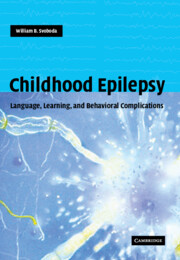Book contents
- Frontmatter
- Contents
- Preface
- Glossary
- 1 Looking ahead
- Part I Speech and language problems
- Part II Learning problems
- 12 Learning challenges
- 13 The development of learning
- 14 Learning difficulties
- 15 Learning problems with seizure types
- 16 Modifying factors
- 17 Transient cognitive impairments of epilepsy
- 18 Attention and alertness
- 19 Memory
- 20 Executive functioning
- 21 Academics
- 22 Antiepileptic medication effects
- 23 Effects of other therapies
- 24 Diagnosis
- 25 Gaining help
- 26 Frustrations of learning problems
- Part III Behavior problems
- Index
- References
25 - Gaining help
from Part II - Learning problems
Published online by Cambridge University Press: 26 October 2009
- Frontmatter
- Contents
- Preface
- Glossary
- 1 Looking ahead
- Part I Speech and language problems
- Part II Learning problems
- 12 Learning challenges
- 13 The development of learning
- 14 Learning difficulties
- 15 Learning problems with seizure types
- 16 Modifying factors
- 17 Transient cognitive impairments of epilepsy
- 18 Attention and alertness
- 19 Memory
- 20 Executive functioning
- 21 Academics
- 22 Antiepileptic medication effects
- 23 Effects of other therapies
- 24 Diagnosis
- 25 Gaining help
- 26 Frustrations of learning problems
- Part III Behavior problems
- Index
- References
Summary
Children with intractable epilepsy often require special educational services because of progressive educational and psychosocial handicaps combined with a devastating seizure problem (Dam, 1990). Special education services may be warranted until better control is achieved. The main goals in working with such children is to prepare them for the demands of adulthood in terms of being able to care for themselves and to be self-supporting.
Learning problems may be reversible or permanent. Drug-induced and epilepsy-induced learning problems are potentially reversible, with consequent improvement in functioning resulting in a significant improvement in the quality of life (Besag, 2001). Even with learning disabilities of a more permanent nature, such as those from seizures causing brain damage, in children the plasticity of the brain may allow partial recovery of function (Henricksen, 1990).
Successfully overcoming a learning disability requires the combination of appropriate medical care working closely with educational experts. Unfortunately, proposals for practical treatment are seldom based on a multidisciplinary approach (Aldenkamp, 1987; Aldenkamp et al., 1990; Radley, 1987; Renier, 1987; Thompson, 1987).
Federal recommendations
The Federal Commission for the Control of Epilepsy and Its Consequences (1978) identified the learning consequences of epilepsy in childhood, resulting in a series of recommendations. The report noted:
The primary responsibility for providing the best possible education for handicapped children rests with the schools. If aware of their problems, schools can take a number of specific actions to help assure that handicapped children do indeed receive the education to which they are entitled …
Teachers believe children with epilepsy have twice as many problems … such as lack of concentration, restlessness, and fidgeting … as their classmates. […]
- Type
- Chapter
- Information
- Childhood EpilepsyLanguage, Learning and Behavioural Complications, pp. 386 - 395Publisher: Cambridge University PressPrint publication year: 2004



